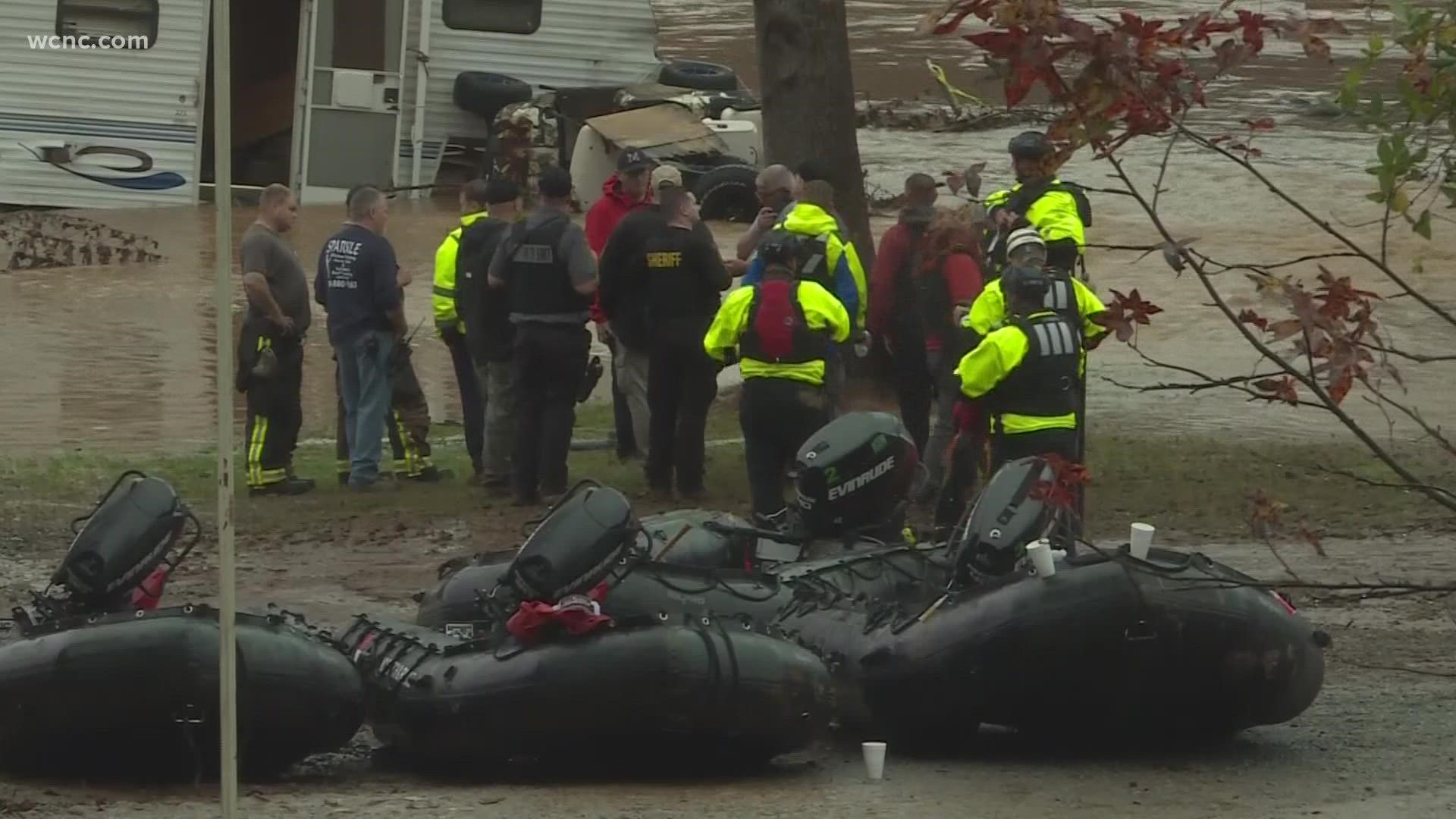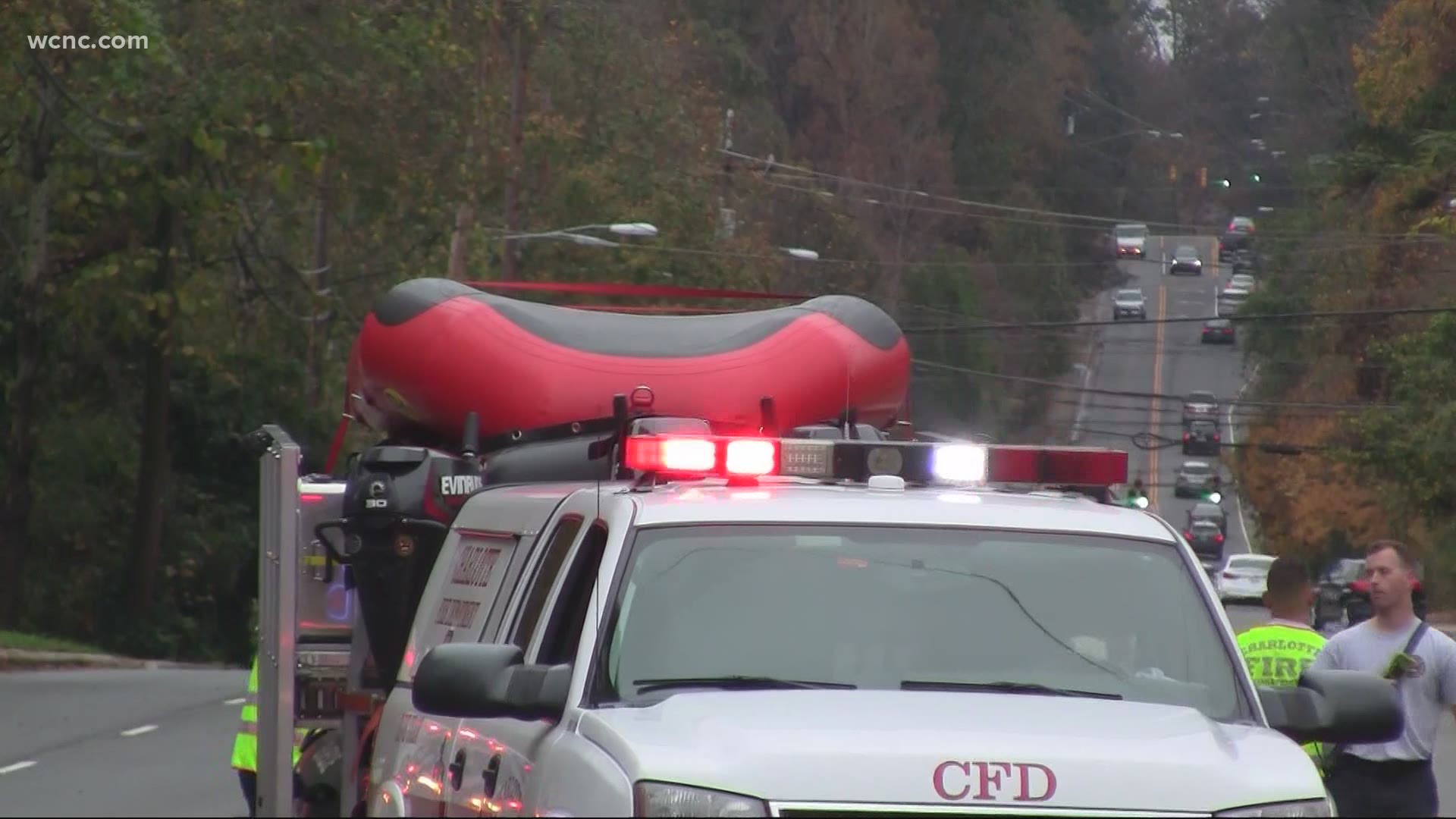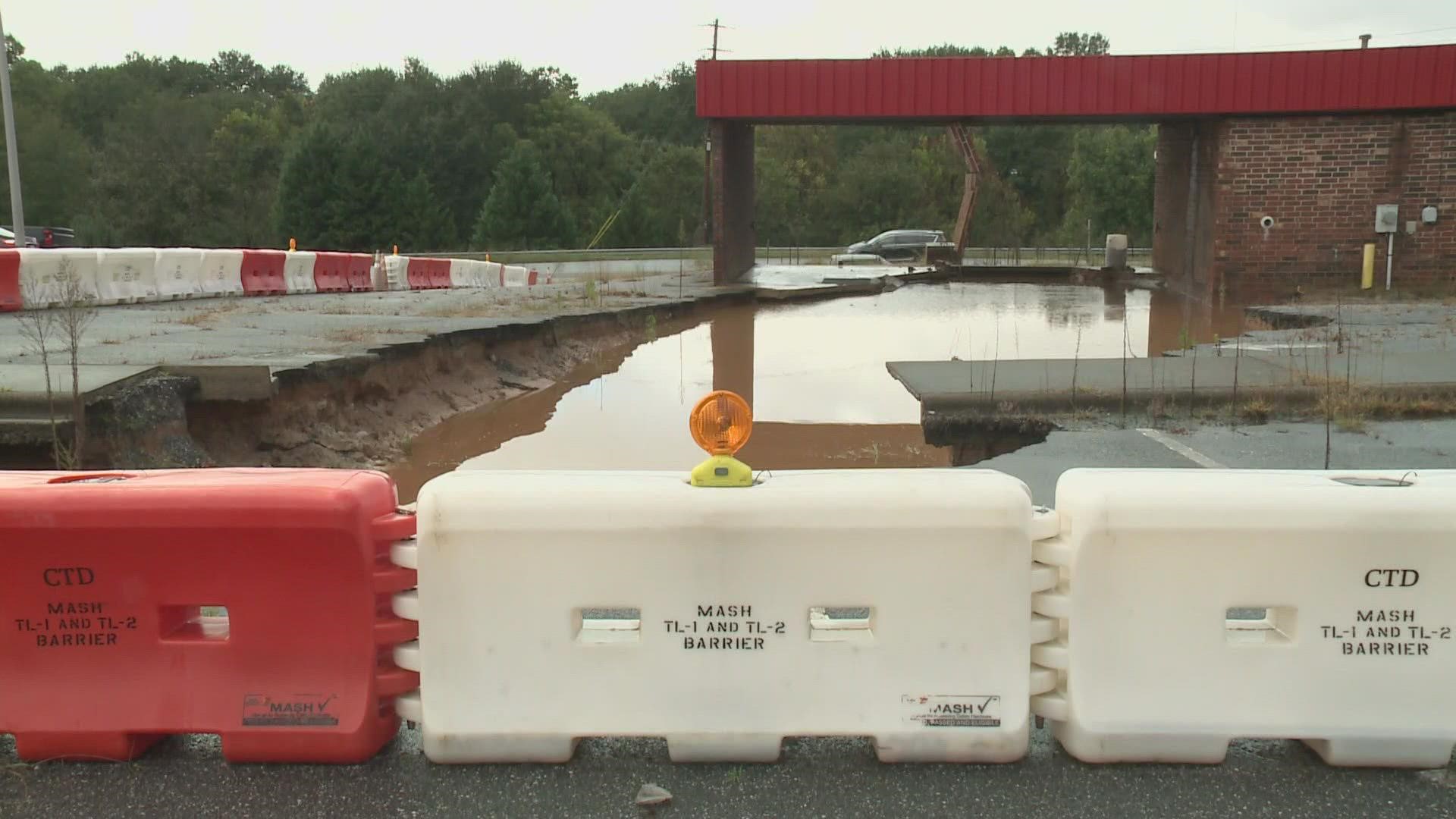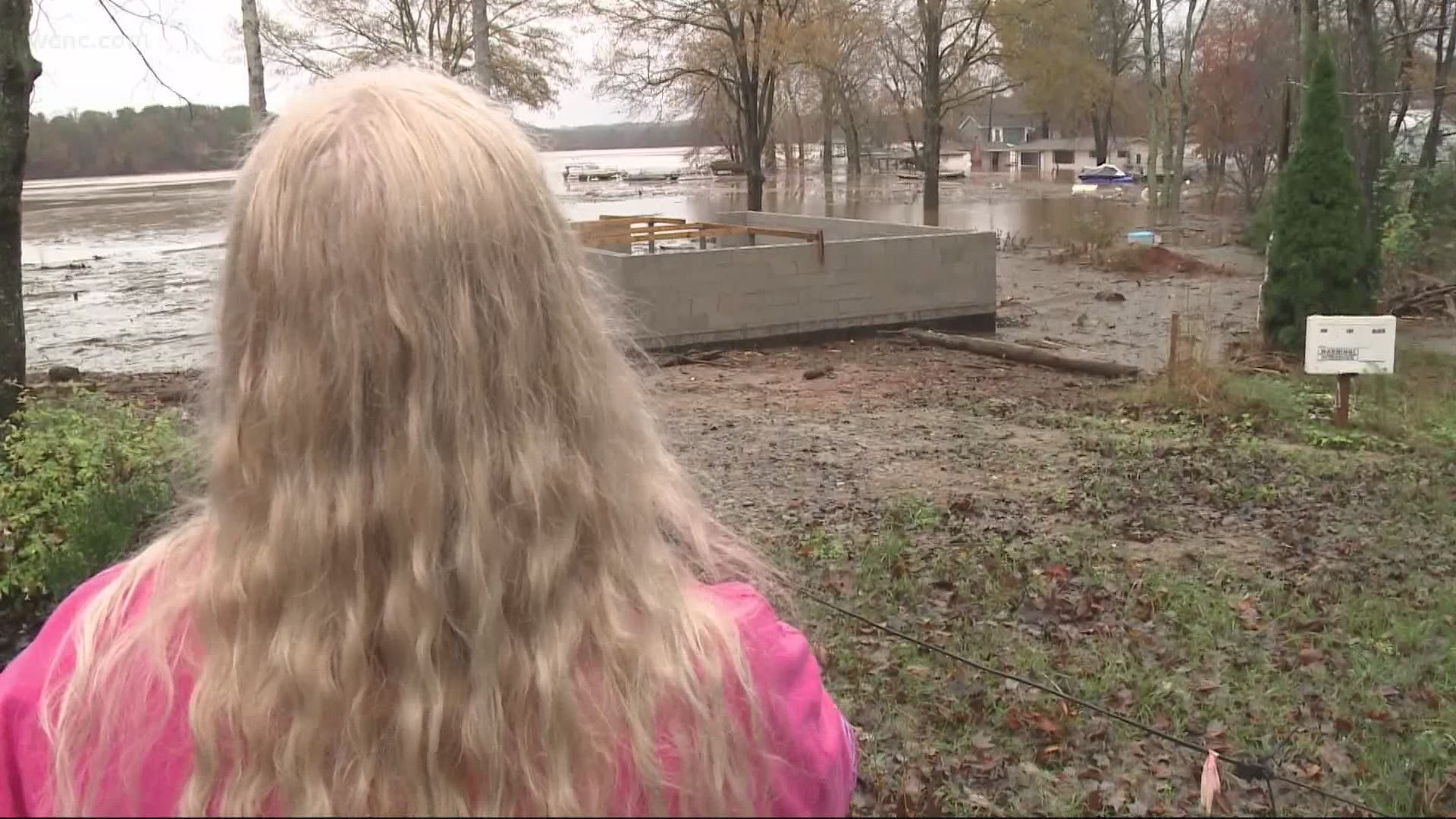- Seven months after Hurricane Helene, Chimney Rock rebuilds with resilience
- Wildfire in New Jersey Pine Barrens expected to grow before it’s contained, officials say
- Storm damage forces recovery efforts in Lancaster, Chester counties
- Evacuation orders lifted as fast-moving New Jersey wildfire burns
- Heartbreak for NC resident as wildfire reduces lifetime home to ashes
A lookback at the deadly Carolina flooding of Nov. 12, 2020
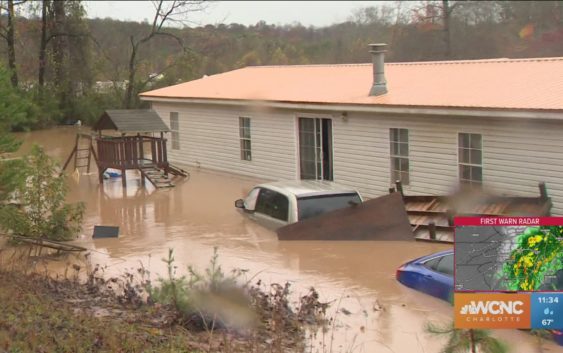
One year ago, North Carolina and South Carolina experienced historic flooding that claimed 6 lives and led to water rescues across numerous counties.
The impact and damage were so severe North Carolina Governor Roy Cooper declared a state of emergency.
The flooding was seen in rural and metro communities alike – including Charlotte and Greensboro. It took days for a swollen Catawba River to return to its banks.
It left many, including WCNC Charlotte’s owned seasoned Larry Sprinkle and Brad Panovich, astounded at the severity of the flooding.
The largest loss of life was at the Hiddenite Family Campground in Alexander County, where 5 people died and more than 30 were rescued.
Alexander County:
6 lives lost
Brittany Van Voorhees contributes
For Gary Herman, the public information officer for Alexander County, Nov. 12, 2020 is a day he will never forget.
The first call came at 4:30 a.m. 911 operators were receiving calls of multiple flooded and impassable roads.
By 5 a.m., the county had an emergency operations center set up and information was flowing through their website, social media, and media partners. By 7 a.m., a shelter was established at East Taylorsville Baptist Church.
During the height of the flood, there were about 50 compromised roads in Alexander County.
“We were very worried about the health and welfare of our citizens and our county,” he told WCNC Charlotte this week.
Six lives were lost in the county flooding. The first confirmed death came in the morning after a culvert collapsed off of Hopewell Church Road and a car was swept away. It took until floodwaters receded for first responders to reach the car and confirm the victim had succumbed.
The nearby Hiddenite Family Campground sits on the bank of the South Yadkin River. Water overflowed the banks and flooded the whole campground. Tragically, five people died there, including a 1-year-old boy.
“I think it was the grandfather who was holding the little boy and hanging onto a tree,” Herman recalls emotionally. “And the boy just slipped out of his grasp.”
Three of the deaths were confirmed at the campground on November 12th. The next day, Urban Search and Rescue were able to find the last two victims, including the child.
“No one wants a tragedy like this to ever happen again,” Herman told WCNC Charlotte meteorologist Brittany Van Voorhees.
Herman, a native of the community, went back in the record books, and could only find one flood that even came close: The Great Flood of 1916, which swept away 3 children from this community.
Throughout the region in 1916, the river flooded for hundreds of miles. By the time water receded, 80 lives were lost and hundreds of homes were ruined, according to lakewylie.com. The government-sponsored transformation of the Cawatba River, and the construction of a new dam, led to the creation of Lake Wylie, the website explained.
Herman said the 2020 event he lived through is forever etched in people’s minds, especially the county employees and local citizens.
“It’s just something you’ll never forget going through.”
Herman encourages their residents to sign-up for the county’s Code Red Alert system, which sends notifications in the event of emergencies.
Contact Brittany Van Voorhees at bvanvoorhe@wcnc.com and follow her on Facebook, Twitter and Instagram.
Hiddenite Campground still formally closed:
Despite the appearances of campers, the owner insists he’s closed
Brandon Goldner contributes
A year later, the Hiddenite Family Campground remains formally closed.
Kent Korte, the campground’s manager, pointed near the top of his office’s porch railing to show where the South Yadkin River crested last year. At the time, the county said the water level reached 14 feet in spots.
Korte said the grandfather of the 1-year-old boy who died encouraged him to reopen the campground.
“[I] had a lot of conversations with him,” Korte said. “I wasn’t sure if we should. He’s the one who said, ‘Yes, we should [reopen].'”
But Gary Herman, Alexander County’s public information officer, said Korte first needs to apply for a special use permit before he can reopen, and Herman said Korte hasn’t submitted an application yet.
Until that permit is approved, Korte risks sanctions against him from the county if he were to reopen.
“According to our chief building inspector, if any [campground] reservations were made, he would cut off the electricity,” Herman said. “We don’t want anything like this to happen again.”
Korte said he’s having trouble getting in touch with a surveyor to plot the land, an action that needs to get done before he can apply for a new permit.
Korte said he doesn’t have anyone staying at the campground.
“No, we have nobody in the campground,” Korte said. “Nobody’s down here at all.”
However, a WCNC Charlotte crew saw RVs and campers still on the property and asked Korte about them.
“You’re saying there are no campers that are staying here overnight?” WCNC Charlotte’s Brandon Goldner asked.
Korte responded, “Um, no, not very often. I’ll leave it at that.”
Contact Brandon Golder at bgoldner@wcnc.com and follow him on Facebook, Twitter and Instagram.
Flooding across the Carolinas:
Flooding in Charlotte, Rock Hill, Hickory and more
James Brierton contributes
“I have been doing weather here for the station for 35 years, and I have never seen this many severe flood warnings like this,” WCNC Charlotte forecaster Larry Sprinkle said that day.
Across the Carolinas, Flash Flood Warnings stretch nearly 300 miles across North Carolina as flooding inundated homes, covered streets, and knocked out utilities.
Charlotte school flooded, evacuated
Along Mallard Creek and David Taylor Drive, the Charlotte Fire Department evacuated 143 people from Corvian Community Elementary School because of floodwaters. No injuries were reported.
All-time record high for Charlotte creeks
“This is the highest water level ever recorded,” WCNC Charlotte Chief Meteorologist Brad Panovich said of the Little Sugar Creek near Atrium Health’s Carolina Medical Center hospital in Charlotte.
Little Sugar Creek near Midtown Park reached a record depth of 16.2 feet as rainfall made its way into the region’s waterways. That observation, recorded by instrumentation near Atrium Health’s Carolina Medical Center, indicates the water level surpassed the 1997 record set during Hurricane Danny.
“Unless you were here in 1997, you have never seen the Little Sugar Creek flood like this near the Medical Center,” WCNC Charlotte chief meteorologist Brad Panovich said. “The greenway is almost overflowing.”
The flooding was captured on a USGS camera.
Man swept away by floodwaters
A man who was riding his bicycle in South Charlotte was rescued after floodwaters from McMullen Creek swept him away. The Charlotte Fire Department found the man clinging to a tree near Sardis Road. The man was transported to the hospital for treatment of non-life-threatening injuries.
Sinkhole opens in Morganton, still left unprepared
The heavy rain created a sinkhole near the Morganton Post Office in Burke County. One year later, the sinkhole has grown because of additional flooding and heavy rains.
In October, the USPS told WCNC Charlotte they were “committed” to fixing the sinkhole.
“We have finished our prep work and are ready to begin construction,” a spokesperson said last month. “Since the project will require construction on neighboring properties easements are necessary before the project can continue. However, not all easements have been granted yet from neighboring property owners.”
On Friday, WCNC Charlotte reached back out to USPS to inquire about the status of the repairs.
State of emergency in Catawba County
In Catawba County, officials declared a State of Emergency due to extensive flooding, power outages, and road closures.
Water rescues in York County
“We have had numerous trees down and power lines down, which is normal for this type of weather. What is unusual is we are seeing water in areas that we typically do not see water in,” York County Emergency Management Director Chuck Haynes told WCNC Charlotte at the time.
Haynes said crews responded to several rescues, both out of homes and out of vehicles throughout York County. Several roads were shut down due to rising water.
What causes flash flooding?
Flooding is the deadliest weather threat to the Carolinas and is the most common of all weather-related natural disasters that happen in all 50 states.
Flood Causes:
- Excessive rainfall (most common here in Charlotte area and mountains)
- Storm surge
- A dam or levee break
- Melting snow or ice
- Ice jams
Flood Warnings and Watches:
A Flood Watch is issued by the National Weather Service when flooding is possible in the coming hours through days.
When flooding has begun or is imminent, the National Weather Service will issue Flood Warnings.
Flash flood warnings come in three tiers called impact base warnings: base, considerable and Catastrophic. Base is used most of the time and it means that flash flooding is possible in your area. The highest and most severe tier is catastrophic.
